
Muthuvel Karunanidhi was an Indian writer and politician who served as Chief Minister of Tamil Nadu for almost two decades over five terms between 1969 and 2011. He is popularly referred to as Kalaignar (Artist) and Mutthamizh Arignar for his contributions to Tamil literature. He had the longest intermittent tenure as Chief Minister of Tamil Nadu with 6,863 days in office. He was also a long-standing leader of the Dravidian movement and ten-time president of the Dravida Munnetra Kazhagam political party. Karunanidhi has the record of never losing an election to the Tamil Nadu Assembly, having won 13 times since his first victory in 1957. Before entering politics, he worked in the Tamil film industry as a screenwriter. He also made contributions to Tamil literature, having written stories, plays, novels, and a multiple-volume memoir. Karunanidhi died on 7 August 2018 at Kauvery Hospital in Chennai after a series of prolonged, age-related illnesses.
Nagalingam Shanmugathasan was a trade unionist and Maoist revolutionary leader in Sri Lanka. He was the General Secretary of the Ceylon Communist Party (Maoist)

The Ceylon Communist Party (Maoist) is a political party in Sri Lanka. The party surged in 1964 following a split in the Ceylon Communist Party. Initially the party just called itself 'Ceylon Communist Party' as well, and was distinguished from the main CCP in Sri Lanka by denominations like 'Ceylon Communist Party (Peking Wing)', etc. In the end of the 1960s the party was one of the major leftist parties in the country. Initially Party was led by Premalal Kumarasiri and N. Shanmugathasan.
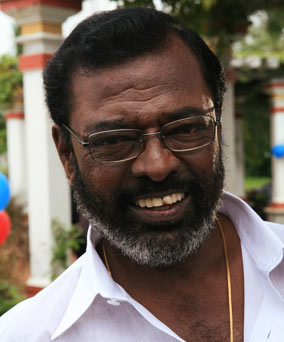
Manivannan was an Indian actor, film director, screenwriter, voice artist, playback singer and social activist who worked in Tamil cinema. In a career spanning three decades, he went from being a story and dialogue writer for director Bharathiraja from 1980–82 to a successful director who thrived in experimenting with different genres, before becoming an actor. With over 400 films to his name, Manivannan was one of the most experienced actors in the field and directed exactly 50 films. Manivannan was mainly a supporting actor in films and often played the comedian, supporting character and villainous roles.

Politics of Tamil Nadu is the politics related to the Indian state of Tamil Nadu.
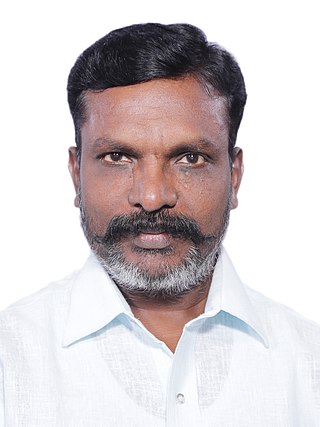
Tholkappiyan Thirumavalavan, better known as Thol. Thirumavalavan is a political leader, scholar and activist from the southern Indian state of Tamil Nadu. He is a Member of Parliament from Chidambaram. Leader and President of Viduthalai Chiruthaigal Katchi. He rose to prominence in the 1990s as a bahujan leader, and formally entered politics in 1999. His political platform centres on ending caste-based discrimination and consequently the caste system. He has also expressed support for Tamil nationalist movements in Sri Lanka.

Senthamizhan Seeman is an Indian politician, actor and former filmmaker. He is the leader and chief-coordinator of the Naam Tamilar Katchi political party in Tamil Nadu. He is a strong advocate for regional autonomy and Tamil nationalism by focusing on the Tamil language, identity, and culture.

P. Jeevanandham also called Jeeva, was a social reformer, political leader, litterateur and one of the pioneers of the Communist and socialist movements in the state of Tamil Nadu, India.

Tamil nationalism is the ideology which asserts that the Tamil people constitute a nation and promotes the cultural unity of Tamil people. Tamil nationalism is primarily a secular nationalism, that focus on language and homeland. It expresses itself in the form of linguistic purism, linguistic nationalism, Social equality and Tamil Renaissance.

Erode Venkatappa Ramasamy, revered by his followers as Periyar or Thanthai Periyar, was an Indian social activist and politician who started the Self-Respect Movement and Dravidar Kazhagam. He is known as the 'Father of the Dravidian movement'. He rebelled against Brahmin dominance and gender and caste inequality in Tamil Nadu. Since 2021, the Indian state of Tamil Nadu celebrates his birth anniversary as 'Social Justice Day'.

The fourth legislative assembly election of Madras State was held in February 1967. The Dravida Munnetra Kazhagam (DMK) led coalition under the leadership of C.N. Annadurai won the election defeating the Indian National Congress (Congress). Anti-Hindi agitations, the rising prices of essential commodities, and a shortage of rice were the dominant issues. K. Kamaraj's resignation as the Chief Minister in 1963, to concentrate on party affairs, along with persistent rumors of corruption had weakened the incumbent Congress Government. This was the first time that a non-congress party had gained a single simple majority in a state assembly in India, second time after Communist Party of India winning Kerala assembly elections in 1957 for a non-Congress party alliance to gain the majority in a state in India, and the last time that Congress held power in Tamil Nadu. It marked the beginning of Dravidian dominance in the politics of Tamil Nadu. Annadurai, who became the first non-Congress chief minister of post-independence Tamil Nadu, died in office in 1969 and V.R. Nedunchezhiyan took over as acting chief minister. Since then, except for brief months of President's rule, only Dravida Munnetra Kazhagam and its splitaway Anna Dravida Munnetra Kazhagam have formed cabinets in the State.

The third legislative assembly election to the Madras state was held on 21 February 1962. The Indian National Congress party, led by K. Kamaraj, won the election. Dravida Munnetra Kazhagam made significant in-roads in the election and emerged as the second party for the first time by winning 50 seats. 1962 Election remains the most recent election in which Indian National Congress to form a majority Government in the State as its support was heavily declined due to rise of Dravidian political parties.

N. Sankaraiah was an Indian Communist Party politician and independence activist.

The second legislative assembly election for the Madras Presidency after the establishment of a bicameral legislature by the Government of India Act of 1935 was held in 1946. The election was held after 6 years of Governor's rule starting from 1939, when the Indian National Congress government of C. Rajagopalachari resigned protesting Indian involvement in World War II. This was the last election held in the presidency - after Indian independence in 1947, the presidency became the Madras state. The election was held simultaneously with that of the Legislative Council. The Congress swept the polls by winning 163 out of 215 seats. The years after this election saw factionalism in Madras Congress party with divisions across regional and communal lines. Competition among T. Prakasam, C. Rajagopalachari and K. Kamaraj resulted in the election of Prakasam as the prime minister initially. But he was later defeated by Omandur Ramaswamy Reddiar with Kamaraj's support. In turn, Reddiar himself was ousted to make way for P. S. Kumaraswamy Raja with the support of Kamaraj.
The second legislative council election for the Madras Presidency after the establishment of a bicameral legislature by the Government of India Act of 1935 was held in March 1946. The election was held after 6 years of Governor's rule starting from 1939, when the Indian National Congress government of C. Rajagopalachari resigned protesting Indian involvement in World War II. This was the last direct election held for the Madras Legislative Council in the presidency - after Indian independence in 1947, the presidency became the Madras state and direct elections to the council were abolished. The election was held simultaneously with that of the Legislative Assembly. The Congress swept the polls by winning 32 out of 46 seats. The years after this election saw factionalism in Madras Congress party with divisions across regional and communal lines. Competition among T. Prakasam, C. Rajagopalachari and K. Kamaraj resulted in the election of Prakasam as the Premier initially. But he was later defeated by Omandur Ramaswamy Reddiar with Kamaraj's support. In turn, Reddiar himself was ousted to make way for P. S. Kumaraswamy Raja with the support of Kamaraj.
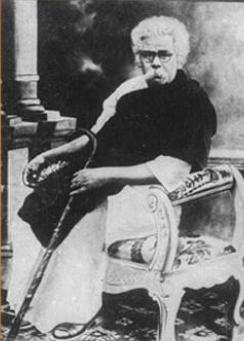
The Self-Respect Movement is a popular human rights movement originating in South India aimed at achieving social equality for those oppressed by the Indian caste system, advocating for lower castes to develop self-respect. It was founded in 1925 by S. Ramanathan who invited E. V. Ramasamy to head the movement in Tamil Nadu, India against Brahminism. The movement was extremely influential not just in Tamil Nadu, but also overseas in countries with large Tamil populations, such as Sri Lanka, Burma, Malaysia and Singapore. Among Singapore Indians, groups like the Tamil Reform Association, and leaders such as Thamizhavel G. Sarangapani were prominent in promoting the principles of the Self-Respect Movement among the local Tamil population through schools and publications.
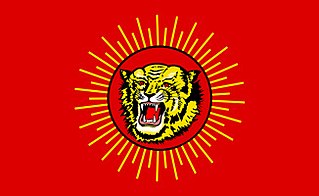
Naam Tamilar Katchi is a Tamil nationalist political party active in the Indian state of Tamil Nadu and the union territory of Puducherry. It is led by former Tamil actor and film director Seeman. The party is noted for its ideology of Tamil Nationalism. It primarily aims for the creation of a vote bank among Tamils.

The Mullivaikkal Memorial or Mullivaikkal Muttram is a memorial dedicated to the Mullivaikkal massacre, the killings of Tamil civilians during the final phase of the war between Liberation Tigers of Tamil Eelam (LTTE) and Sri Lankan armed forces at Mullivaikkal in 2009. The Mullivaikal Memorial is in the Thanjavur District of the Tamil Nadu state in neighboring India. On 6 November 2013, the inauguration of the Mullivaikal Memorial took place. Tamil leader Pazha Nedumaran and the World Tamil Confederation Trust he heads are the founders.
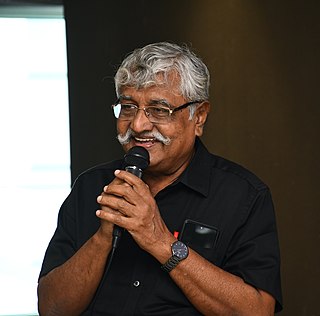
Subbaiah Veerapandian, known popularly as Suba Veerapandian or Subavee, is an Indian political activist, author, orator, former Tamil-language professor and former film artist. Since 2007, he has been serving as the general secretary of the Dravida Iyyakka Tamilar Peravai, a Tamil Nadu-based political organisation that aims to promote Ambedkarite, Dravidian and Marxist ideals in the State and elsewhere.
Viduthalai (transl. Liberation) is a Tamil newspaper published from Chennai, Tamil Nadu, India.














